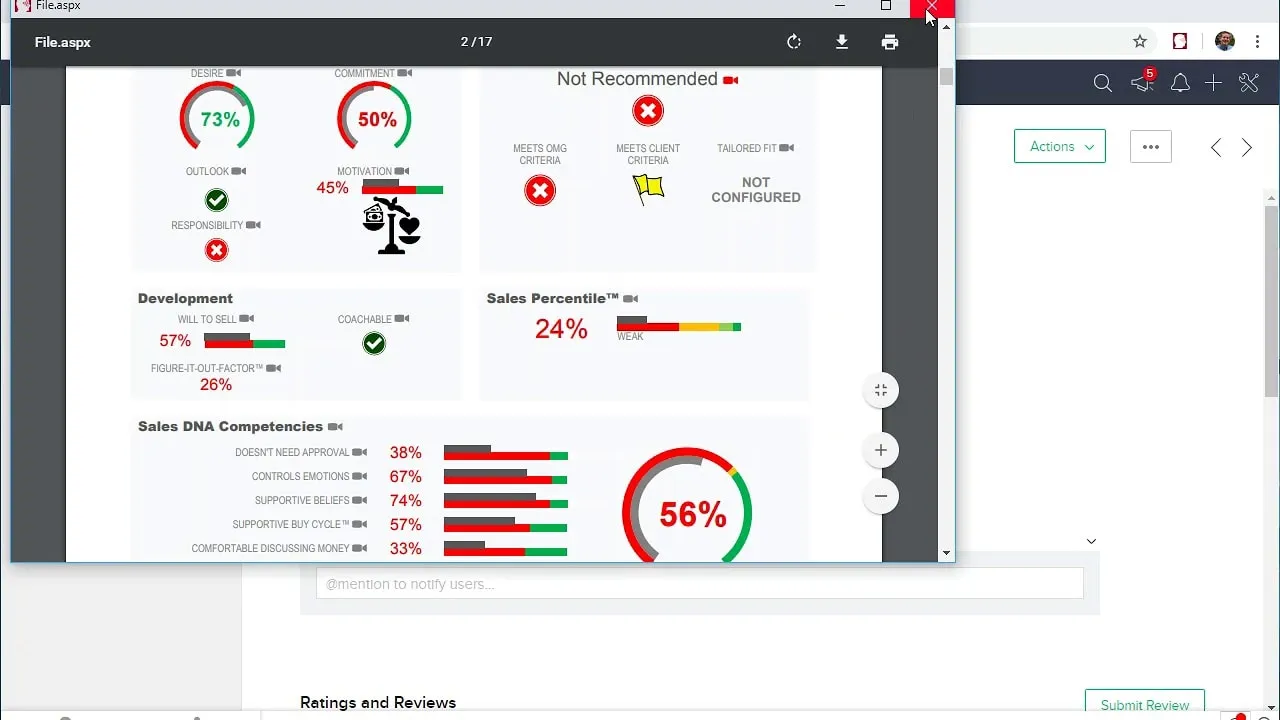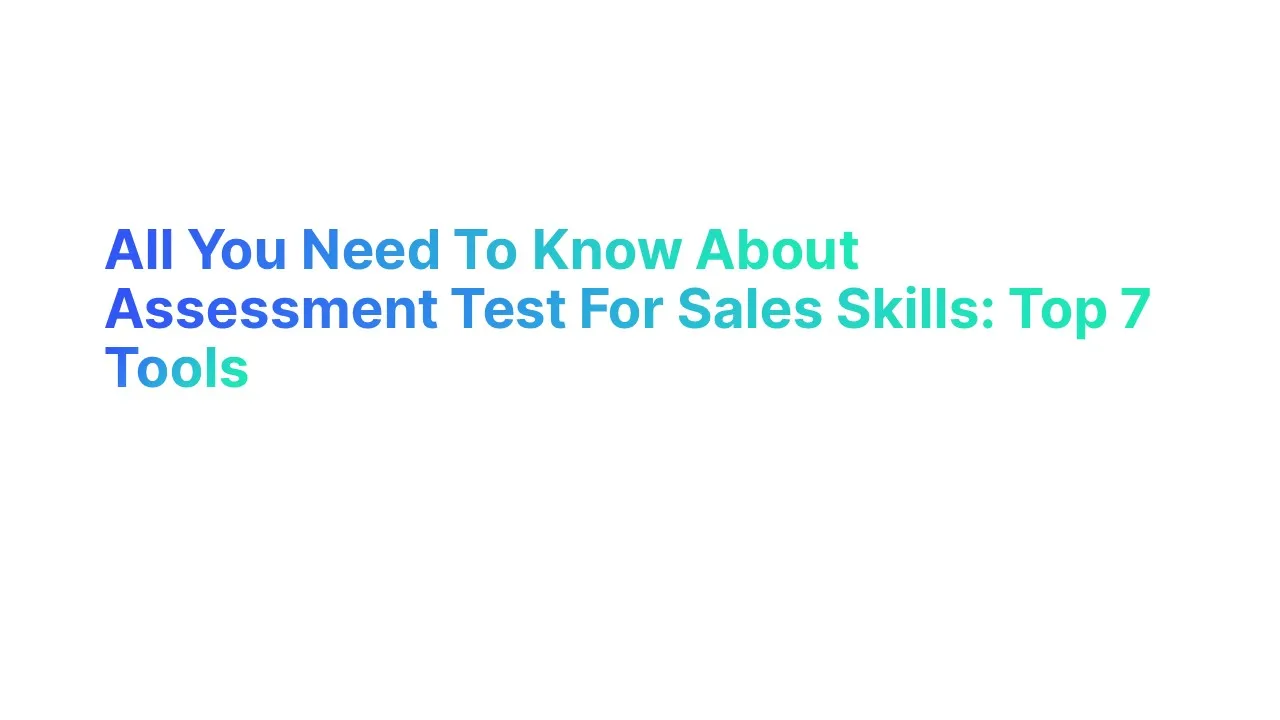What is a Sales Skills Assessment?

A sales skills assessment is a test designed to measure the abilities of sales candidates. It helps to identify strengths and areas for improvement. These assessments are used in the hiring process to ensure that only the best candidates are selected for sales roles.
Therefore, pre-employment screening for sales pipeline should include a combination of sales assessment questions, tests and background checks. Sales assessment questions should be designed to uncover a candidate’s approach to handling objections.
A well-structured sales organization uses assessment tests to place the right people in the right roles. Candidates can be assessed on their ability to conduct an effective sales call through simulated scenarios.
According to a study by the Aberdeen Group, companies that use sales assessments see a 19% higher quota attainment.
The Harvard Business Review found that using data-driven assessments can improve the quality of hire by 25%.
Why is Sales Skills Assessment Test Important?
.1.Identifies Top Performers
- A sales skills assessment test helps in finding the best candidates.
- By testing specific skills, you can see who has the abilities needed for success in sales roles.
- This ensures your sales team consists of top talent.
2.Improves the Hiring Process
- Using a sales skills assessment makes the hiring process more effective and efficient.
- It helps hiring managers make informed decisions.
- The sales manager plays a crucial role in interpreting sales assessment results and guiding the sales team based on these insights.
- Reduces the chances of hiring the wrong person and saves time and money.
3.Measures Specific Skills
- Sales skills assessments test for specific skills such as communication skills, problem-solving skills, and time management. Soft skills, such as empathy and active listening, are crucial for building strong relationships with customers.
- Knowing these skills helps place the right people in the right positions.
4.Reduces Turnover
- Hiring the right candidates reduces turnover.
- When you select sales representatives with the right skills, they are more likely to succeed and stay with the company longer.
- This leads to a more stable and effective sales team.
5.Provides Data-Driven Insights
- Sales assessments provide data on each candidate's abilities.
- This data helps in making informed hiring decisions.
- Helps in understanding the strengths and weaknesses of your sales team.
6.Enhances Training Programs
- The results of sales skills assessments can be used to improve training programs.
- By knowing where sales representatives need improvement, you can tailor training to address these areas.
- Leads to better performance and higher sales targets.
7.Supports Continuous Improvement
- Regular use of sales assessment tests supports continuous improvement.
- Helps keep your sales team at the top of their game by regularly updating their skills.
Different Types of Sales Assessment Tests
Sales aptitude tests are designed to measure innate abilities and predict future success in sales roles. Understanding of customer needs and how candidates engage with a potential customer can be evaluated through role-playing exercises during assessments.
1. Personality Tests

A sales personality test can reveal more insight into whether a candidate has the personality traits necessary for a successful salespeople.
- Help understand a candidate's traits and how they fit into the sales role.
- Reveal if someone is outgoing, confident, and good at building relationships.
- Assist hiring managers in determining if the candidate is a good match for the sales team.
2. Situational Judgment Tests

- Show how a candidate might handle real-life sales situations.
- Present different scenarios and ask candidates to choose the best action.
- Test problem-solving skills and the ability to handle objections.
3. Numerical Reasoning Tests

- Measure a candidate's ability to work with numbers.
- Ensure that sales representatives can understand data and sales targets.
- Check if candidates can analyze figures, which is crucial for meeting sales goals and making informed decisions.
4. Error Checking Tests

- Evaluate attention to detail.
- Ensure that candidates can spot errors in sales reports, contracts, and communications.
- Help prevent small mistakes that could lead to big problems in sales.
5. Verbal Reasoning Tests

- Assess a candidate's ability to understand and process written information.
- Ensure good communication skills, which are essential for sales roles.
- Check if candidates can understand and respond to written communication from potential customers and colleagues.
Top 7 Tools For Sales Assessment Test
Sales talent assessment tools help in evaluating a candidate’s ability to fit into the company culture and excel in sales roles.
1. Sales Skill Assessment Scorecard by HubSpot

The Sales Skill Assessment Scorecard by HubSpot is a comprehensive tool that evaluates a candidate's skills in key areas.
Features:
- Customizable Criteria: You can tailor the scorecard to focus on specific skills important to your sales role.
- Detailed Scoring System: Provides a clear and detailed scoring system to assess different sales skills.
- Easy to Use: Simple format that hiring managers can easily use during the interview process.
Why It’s Important:
- Helps identify the specific skills a candidate possesses.
- Provides a structured way to compare different candidates.
- Enhances the hiring process by focusing on important sales skills.
Pricing: Free
Usage: Ideal for both the hiring processes and ongoing assessments.
2. The Caliper Profile by Caliper

The Caliper Profile is a popular sales assessment test that measures a candidate’s personality traits and potential for success in a sales role.
Features:
- Personality Insights: Assesses personality traits such as confidence, motivation, and relationship-building skills.
- Predictive Analytics: Uses data to predict how well a candidate will perform in a sales position.
- Comprehensive Report: Provides a detailed report that helps hiring managers make informed decisions.
Why It’s Important:
- Offers deep insights into a candidate's potential for success.
- Helps in making data-driven hiring decisions.
- Reduces the risk of hiring the wrong candidate.
Usage: Best for detailed personality assessment in the hiring process.
3. SalesDNA by MTD Training Specialists

SalesDNA by MTD Training Specialists is a tool designed to assess a candidate's sales skills and identify areas for improvement.
Features:
- Skill Assessment: Evaluates various sales skills such as communication, negotiation, and closing deals.
- Feedback Reports: Provides detailed feedback on strengths and areas needing improvement.
- Development Plans: Offers personalized development plans to help candidates improve their skills.
Why It’s Important:
- Helps in identifying both strong and weak areas of a candidate's skillset.
- Provides actionable insights to improve sales skills.
- Enhances the overall quality of the sales team by focusing on continuous improvement.
Usage: Ideal for developing and improving the presentation skills of your sales team.
4. The DriveTest® by SalesDrive

The DriveTest® is designed to measure a candidate and hiring manager's drive to succeed in sales. It focuses on three key areas: need for achievement, competitiveness, and optimism.
Features:
- Measures key personality traits.
- Provides a detailed report on a candidate's drive.
- Offers insights into the candidate's potential for success in a sales position.
Why It’s Important:
Understanding a candidate's drive helps predict their performance and fit within the sales team. It ensures hiring managers select individuals who are naturally motivated and competitive, crucial for meeting sales targets.
Usage: Ideal for developing and improving the skills of your sales team.
5. SalesGenomix® by SalesGenomix

SalesGenomix® offers a comprehensive assessment tailored to specific sales roles. It evaluates cognitive abilities, personality traits, and sales skills.
Features:
- Customizable to different sales positions.
- Assesses cognitive skills and personality traits.
- Provides a sales skills assessment test.
Why It’s Important:
Customizing the assessment to specific sales roles ensures that the right skills and traits are matched to the job requirements. This leads to better hiring decisions and improves the overall sales and recruitment process for most companies.
Usage: Ideal for matching candidates to the right sales roles.
6. Objective Management Group’s Sales Assessment

Objective Management Group (OMG) offers a detailed sales assessment that evaluates a candidate’s ability to sell, have good relationships, manage sales, and understand the sales process.
Features:
- Assesses over 21 sales core competencies.
- Provides a comprehensive evaluation of sales-specific skills.
- Includes insights into the candidate’s ability to handle objections and close sales.
Why It’s Important:
OMG's assessment helps identify strong candidates for sales call by evaluating essential sales competencies. This ensures that the best candidates are selected for the sales team, leading to increased sales and business growth.
Usage: Best for thorough evaluation and predictive hiring.
7. HireVue’s Sales Assessment Tool

HireVue offers an innovative approach to sales assessment by using AI and video interviewing. It evaluates communication and interpersonal skills used, personality traits, and sales aptitude.
Features:
- Uses AI to analyze video interviews.
- Assesses communication skills and sales aptitude.
- Provides a detailed report on candidate performance.
Why It’s Important:
HireVue’s tool offers a modern and efficient way to assess candidates, saving time for hiring managers. It ensures that candidates possess the right communication skills and personality traits for the sales sector.
Usage: Best for remote hiring and detailed video assessments.
How to Use Sales Assessment Test Tools Effectively

Streamlining hiring processes with assessment tests can reduce time-to-hire and improve candidate quality.
1. Select the Right Tools
Choosing the right tools is the first step in testing for the best salespeople' skills.
Identify Your Needs: Understand what you need to test for sales skills, like communication skills or problem-solving skills. Knowing your own needs also helps in the hard skills and picking the right tools.
Choose Comprehensive Tools: Pick tools that cover all important areas like personality tests, sales and written communication skills, assessment tests, and problem-solving assessments. Ensure the tools are detailed and reliable.
2. Integrate Assessments into Your Hiring Process
Integrating sales assessment tests into your hiring process makes it more effective.
Early Assessment: Use the sales assessment test early in the hiring process to filter out candidates who do not have the necessary skills. This saves time and ensures you interview only the best candidates.
Combine with Interviews : Combine the assessment results with interviews. Use the test results to guide your interview questions for better understanding of the candidate's ability.
3. Ensure Validity and Reliability
Ensuring the validity and reliability of your assessment tools is crucial.
Validate Tools: Make sure the tools you use are valid and measure what they are supposed to measure. Reliable tools give consistent results, ensuring accurate hiring decisions.
Regularly Update: Update your assessment tools regularly to keep them relevant and effective. Changes in your sales team and market needs require updated tools.
4. Interpret Results Accurately
Accurately interpreting and thorough understanding the results of sales assessment tests is key to making informed hiring decisions.
Understand the Metrics: Learn how to read the results from the sales assessment tests. Understand what each score means and how it relates to the skills needed for the sales manager' role.
Use Professional Interpretation: If possible, get a professional to help interpret the results for deeper insights. This ensures you get the most out of your assessment tools.
5. Provide Training for Assessors
Training the people who use sales assessment tests is crucial. Well-trained assessors can accurately interpret sales assessment test results and make better hiring decisions.
Train Hiring Managers: Make sure your hiring managers know how to use the sales assessment tools. Provide training sessions for hiring manager to teach them how to interpret the results accurately.
Bias Awareness: Educate hiring managers about bias. Teach them to recognize and avoid biases that could affect their decisions. This ensures a fair hiring process.
6. Create a Balanced Evaluation
A balanced evaluation combines different methods to get a full picture of each candidate's abilities.
Combine Multiple Assessments: Use different types of sales assessment tests. This gives you a complete view of each candidate's abilities. For example, combine personality tests with soft skills assessments to see both their traits and capabilities.
Holistic Review: Look at the candidate's overall performance in all assessments. Don’t rely on just one test. This helps you make more informed hiring decisions.
7. Utilize Assessments for Development
Sales assessment tests are not just for hiring. They can also help in the development of your sales team.
Continuous Feedback: Use the results of sales assessment tests to give feedback to your sales team. Regular feedback helps them improve their skills and performance.
Career Pathing: Help your sales representatives grow in their careers. Use the assessment results to guide them in their career path. Show them where they excel and where they can improve.
8. Ensure Candidate Experience
A positive candidate experience is crucial. It makes candidates feel valued and respected.
Transparency: Be clear with candidates about the assessment process. Explain why you are using these tests and how the results will be used. This builds trust and makes candidates feel valued.
Feedback: Provide feedback to candidates after the assessment. Let them know their strengths and areas for improvement. This not only helps them but also enhances your company's reputation.
Conclusion
Using a test for sales skills is very important for building a strong sales team. Sales assessment tools help you find the best candidates by evaluating their skills and personality traits. This makes the hiring process more effective and ensures you have the right people in the right roles.
Train your hiring managers to use these tools correctly. Combine different types of assessments for a balanced view of each candidate. Use the results to give feedback and help your team grow. Always be clear with candidates about the interview process and provide helpful feedback.
By following these steps, you can improve your hiring process and develop a top-performing sales team. This approach helps you make better hiring decisions and supports the growth of your business. Use sales assessment tests to find and develop the best talent for your sales team.







.webp)

